I tracked my sleep with an Apple Watch, Fitbit and Oura Ring – here’s which one was most accurate
Three nights, three trackers: how do the numbers compare?
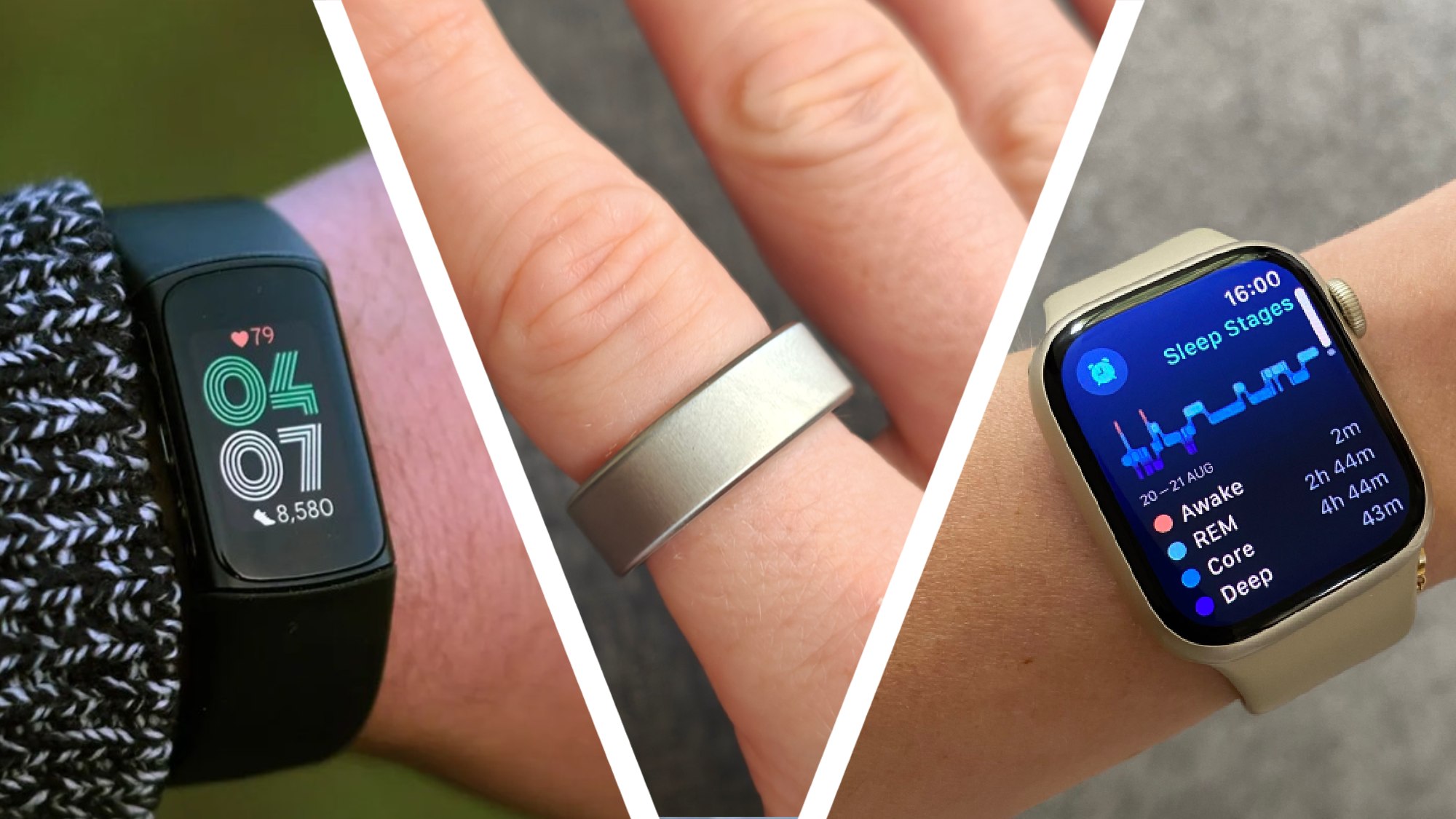
Getting a good night’s sleep isn’t always easy, which is why sleep tracking has become a headline feature on many wearables. The best sleep trackers promise to tell us how well we’ve really slept, but I’ve been wearing my Apple Watch to bed for over a year now, and I’d be lying if I said I didn’t have doubts about its accuracy.
So, I wanted to crunch the numbers and see how reliable sleep trackers really are. I compared my Apple Watch Series 9 with a Fitbit Charge 6 and the Oura Ring Generation 3, wearing the devices to bed for three nights straight. I didn’t just want the raw numbers, like total sleep and time spent in each stage – I wanted to see how well the scores matched up with how rested I actually felt the next morning.
Between them, these three wearables make up some of the best smartwatches and best smart rings on the market, and each one takes a slightly different approach to sleep. The Apple Watch leans on the Health app for insights, Fitbit serves up an easy-to-digest Sleep Score, and Oura combines multiple health signals into a “readiness” rating. But which one feels most accurate in practice? That’s what I wanted to find out.
The contenders
- Apple Watch Series 9 – Tracks sleep stages and total time, but you’ll need to dive into the Health app for extras like respiratory rate or wrist temperature.
- Fitbit Charge 6 – Delivers clear stage breakdowns alongside a nightly sleep score, making it easy to see at a glance how well you rested.
- Oura Ring Gen 3 – Goes beyond sleep tracking with detailed physiology, including HRV, body temperature shifts, and a daily readiness score.
Total sleep: which tracked the most?
The first thing I looked at was the simplest: how long each device said I’d slept. Over the three nights of testing, the differences were surprisingly consistent.
Across the board, the Apple Watch Series 9 was the most generous, regularly giving me the highest total sleep time. On night three it logged 8 hours 28 minutes, a full 13 minutes more than Fitbit and slightly more than Oura, despite showing almost no awake time at all – just 4 minutes, which felt unrealistically low.
Fitbit sat in the middle ground, with totals hovering around the 8-hour mark. Night one came in at 7 hours 42 minutes, while night two was a neat 8 hours. Its estimates of awake time (28-57 minutes) felt closer to reality than Apple’s.
Oura was less generous than the other two. On the first night it logged just 7 hours 29 minutes – nearly 25 minutes less than the Apple Watch. Across all three nights, the ring’s numbers were consistently the leanest.
What was interesting was how the numbers compared to how I actually felt. Night two, for example, was one of those where I woke up repeatedly and started the day feeling groggy. Yet both Fitbit and Oura still credited me with around eight hours of total sleep, while Apple pushed that even higher. It made me realize that I might subjectively anticipate my sleep to be worse than it actually is.
That said, because the Apple Watch consistently overestimated my sleep compared to the other two, my doubts about its accuracy felt pretty well-founded.
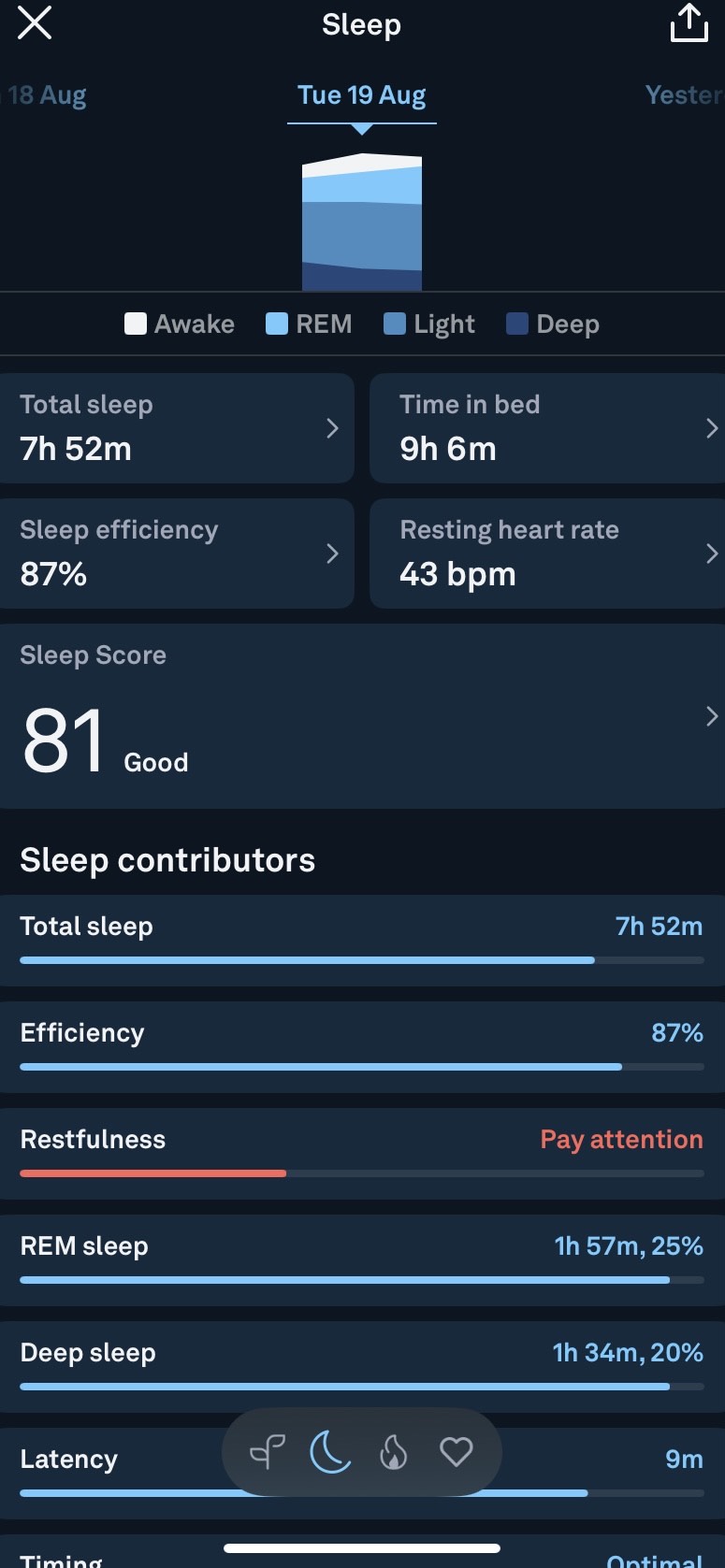
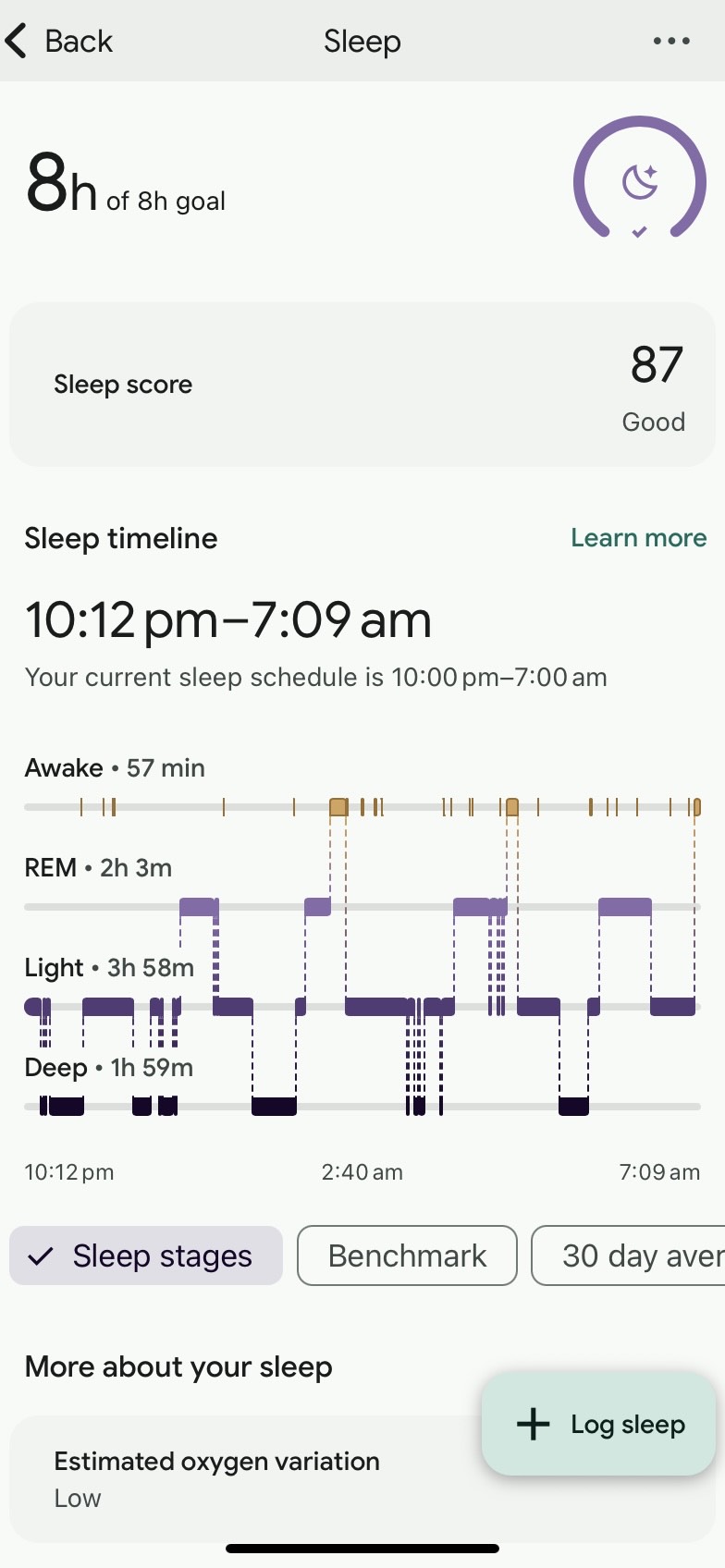
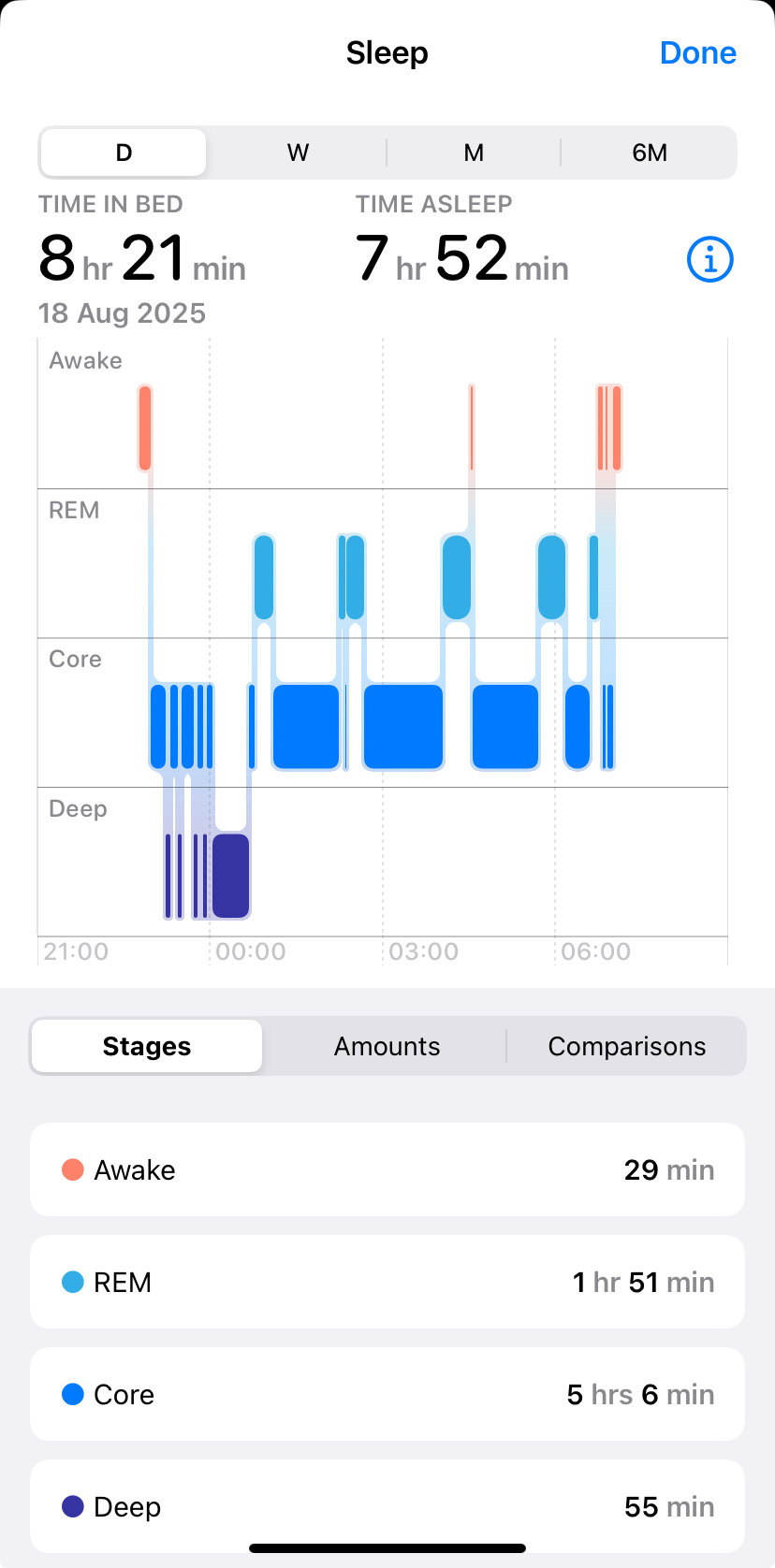
Sleep stages: differences in REM and Deep
Where things got really interesting was in the breakdown of sleep stages. All three devices divide your sleep into light (or “core” for Apple), deep, and REM – plus awake time – but the numbers from each wearable could be noticeably different.
The Oura Ring consistently reported the most deep sleep, especially on night one, where it gave me just over two hours, compared to 55 minutes from Apple. Fitbit landed in the middle with 1 hour 18 minutes, which still felt more realistic than Apple’s lowball figure. In fact, the Apple Watch never recorded more than 58 minutes of deep sleep, which was significantly lower than the other two.
REM sleep estimates were more closely aligned, usually between 1.5 and 2.5 hours a night. Still, the balance shifted slightly – Fitbit often leaned higher, Oura slightly lower, and Apple somewhere in between.
This highlighted how hard it is for wearables to pin down the exact balance of stages. The broad trends – like Oura giving me more deep sleep, Fitbit leaning heavier on REM – were clear, but the lack of consistency made it hard to know which one to trust.
What did match up was how I felt the next morning. On the nights where Oura and Fitbit credited me with more deep sleep, I felt sharper and more rested. Apple’s stage data, by comparison, often fell too flat to capture the real variations between nights.
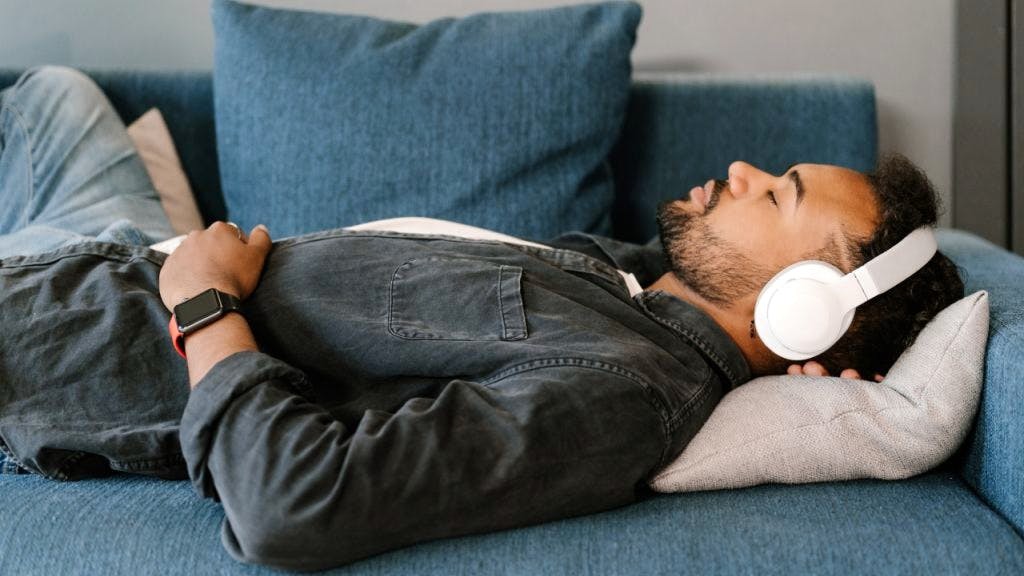
Sleep scores and readiness: clearer guidance or just numbers?
One of the biggest differences between the three trackers was how they presented the data. Raw numbers are one thing, but I also wanted to know which device gave me the clearest sense of how well I’d slept.
The Fitbit Charge 6 keeps things nice and simple. Each morning I got a sleep score out of 100, combining duration, quality, and restlessness into one number. I will say though that on my worst night – where I woke up several times and felt groggy the next day – Fitbit still gave me a sleep score of 87, which felt far too generous.
The Oura Ring went a step further, layering in not only a sleep score but also a readiness score based on things like HRV, resting heart rate, and temperature changes. This felt more in tune with how I was actually feeling. Case in point: the readiness score dropped from 94 to 79 after my restless night.
The Apple Watch Series 9 doesn’t provide a sleep score at all, instead leaving you with stage breakdowns and total time in the Health app. While the raw numbers are always interesting, a sleep score is better for giving you an overview at a glance. For me, this is where Fitbit and Oura pulled ahead. Even if the numbers weren’t perfect, their scoring systems translated the data into something more actionable, whereas Apple left me to interpret the results on my own.
Final verdict
After three nights of head-to-head testing, the differences were clear. The Apple Watch Series 9 consistently overestimated my total sleep and under-reported awake time, which has pretty much affirmed my original doubts about its accuracy. The stage data also felt too rigid, with deep sleep flatlining at around 55 minutes no matter what.
Between the other two, Oura came closest to matching how I actually felt each morning, thanks to its readiness score picking up on fatigue after restless nights. Fitbit was easy to interpret but sometimes painted a rosier picture than how I felt. In the end, it was Oura that offered the most nuanced insights, and it would be my pick if sleep tracking accuracy is your priority.
You might also like...
Sign up for breaking news, reviews, opinion, top tech deals, and more.
Katie Sims is a freelance journalist who writes about a variety of topics for publications including Marie Claire, Woman&Home, Who What Wear, and Ideal Home. She graduated with a Master's in Media and Journalism in 2021 and has been writing engaging digital content ever since. Her biggest passion is all things health and wellness, and she's tested fitness devices, workout methods, and nutritional advice to see what can help her (and others) feel good from the inside out. When she's not writing health and wellness content, she'll either be on a long walk, at a Pilates class, or tackling her long list of books to read.
